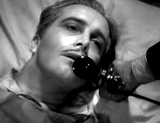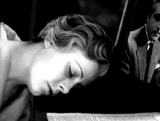
|
Back Street (1932)
In director John Stahl's romantic, pre-Code 'weepie'
melodrama of an ill-fated romance, extra-marital and sacrificial
love, based upon Fannie Hurst's best-selling (and scandalous) 1931
novel (and remade in 1941 with Charles Boyer and Margaret Sullavan,
and in 1961 with Susan Hayward and John Gavin):
- the long-lasting relationship and steadfast love
and devotion between 'mistress' Ray Schmidt (Irene Dunne) and her
'taken' man Walter Saxel (John Boles), a successful financier-banker,
that lasted for their entire lifetimes
- the early scenes depicted Ray's character as wild,
flirtatious, free, independent and carefree (a "good-time girl" with
multiple suitors); but after her initial romantic hook-up with Walter
in turn of the century Cincinnati and subsequent separation (and
a missed chance to meet his mother), they accidentally remet again
five years later in New York when she surrendered to love, gave up
her career and financial independence, and became the married man's
permanent 'back street mistress' or make-believe wife - she was an
alienated heroine outcast and kept tucked away joylessly in a cheap
and tiny apartment while he was married to wife Corinne (Doris Lloyd)
with two children
- the pleasant visits when Walter enjoyed chocolate
and gingerbread in Ray's apartment, although she mostly experienced
shame, loneliness, anguish and the negation of her potential motherhood
- the closing death sequence in Paris after Walter had
suffered a stroke, and his last thoughts turned to Ray - he could
only say her name during his requested final phone call with her
before he died; she replied to him: "Walter... yes, I'm here!
I'm listening...I can't hear you, dear. What are you trying to say
to me?"; she intently listened (the phone receiver was set down)
as Walter's son Richard "Dick (William Bakewell) reacted to
the death: ("Dad, Dad! Nurse! Doctor!") and she heard the
doctor's somber pronouncement: ("He's passed on"); Ray
screamed out Walter's name in shock and begged: "Don't leave
me!" and then collapsed to the floor
|
Ray's Phone Conversation with Walter as He Died
of a Stroke
|

|

|

|

|
- following Walter's death, the tearful Ray sat in
mourning in her shabby Parisian apartment, next to Walter's portrait;
Walter's son visited Ray, and was now very sympathetic to Ray's
feelings of true love and her dire plight; he explained: "His
last thoughts were of you, Mrs. Schmidt"; he was astonished
to learn that she had been sustained or provided for by only $200/month
("You mean everything? Good heavens!"); because she was
not in Walter's will, he promised to continue to provide for her
well-being
- the film's powerful visualization of a direct connection
between Walter (represented by a head-shot of his portrait next to
her) and Ray when she spoke to him about how nice Richard had been
to her, and their missed opportunities together: "Your son is
going to take care of me. He was so nice. He might have been my son,
our son. I wonder, Walter, what would have happened if I'd met your
mother that day in the park"; desperate to be with Walter, she
retreated into fantasy and replayed in her mind that she had actually
met his mother (Maude Turner Gordon) at a local band concert in the
park, who greeted her warmly: "So you are Ray Schmidt. You are nice.
My dear, you are all he said you were. And I hope you both will be
very happy"
- in the film's final moments, Ray was able to transcend
time and any other barriers (social and physical) that stood between
them -- she murmured: "I'm coming, Walter, I'm coming" and
succumbed (by slowly bowing her head onto the table holding Walter's
portrait)
|


Ray in Mourning After Walter's Death (Next to Framed Portrait)


Fantasy Replay of Meeting Walter's Mother

Ray's Death: "I'm coming Walter, I'm coming"
|






